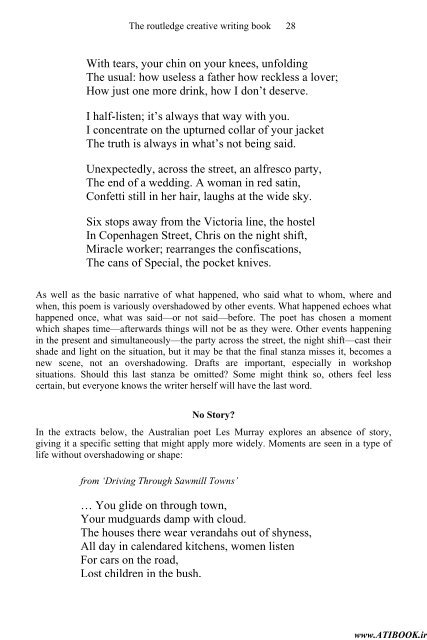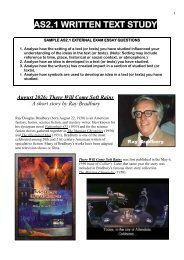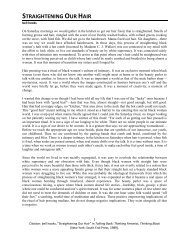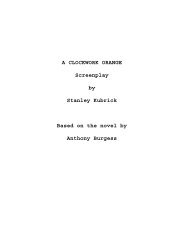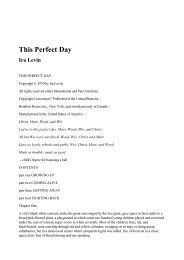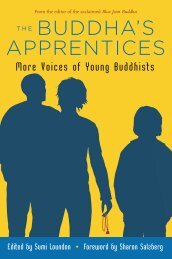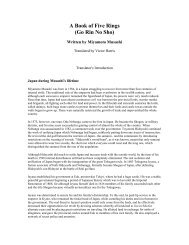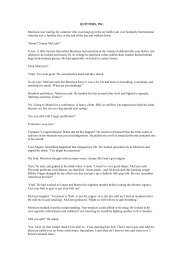- Page 1 and 2: www.ATIBOOK.ir
- Page 3 and 4: www.ATIBOOK.ir
- Page 5 and 6: www.ATIBOOK.irFirst published 2006
- Page 7 and 8: www.ATIBOOK.ir
- Page 9 and 10: www.ATIBOOK.irPREFACESomewhere betw
- Page 11 and 12: Miroslav Holub, ‘The Fly’, from
- Page 13 and 14: www.ATIBOOK.irThe routledge creativ
- Page 15 and 16: www.ATIBOOK.irThe routledge creativ
- Page 17 and 18: www.ATIBOOK.irThe routledge creativ
- Page 19 and 20: www.ATIBOOK.irThe routledge creativ
- Page 21 and 22: www.ATIBOOK.irThe routledge creativ
- Page 23 and 24: www.ATIBOOK.irThe routledge creativ
- Page 25 and 26: www.ATIBOOK.irThe routledge creativ
- Page 27 and 28: www.ATIBOOK.irThe routledge creativ
- Page 29 and 30: www.ATIBOOK.irThe routledge creativ
- Page 31 and 32: www.ATIBOOK.irThe routledge creativ
- Page 33 and 34: www.ATIBOOK.irThe routledge creativ
- Page 35 and 36: www.ATIBOOK.irThe routledge creativ
- Page 37: www.ATIBOOK.irThe routledge creativ
- Page 41 and 42: www.ATIBOOK.irThe routledge creativ
- Page 43 and 44: www.ATIBOOK.irThe routledge creativ
- Page 45 and 46: www.ATIBOOK.irThe routledge creativ
- Page 47 and 48: www.ATIBOOK.irCHAPTER 2PERSONAL NAR
- Page 49 and 50: www.ATIBOOK.irThe routledge creativ
- Page 51 and 52: www.ATIBOOK.irThe routledge creativ
- Page 53 and 54: www.ATIBOOK.irThe routledge creativ
- Page 55 and 56: www.ATIBOOK.irThe routledge creativ
- Page 57 and 58: www.ATIBOOK.irThe routledge creativ
- Page 59 and 60: www.ATIBOOK.irThe routledge creativ
- Page 61 and 62: www.ATIBOOK.irThe routledge creativ
- Page 63 and 64: www.ATIBOOK.irThe routledge creativ
- Page 65 and 66: www.ATIBOOK.irThe routledge creativ
- Page 67 and 68: www.ATIBOOK.irThe routledge creativ
- Page 69 and 70: www.ATIBOOK.irThe routledge creativ
- Page 71 and 72: www.ATIBOOK.irThe routledge creativ
- Page 73 and 74: www.ATIBOOK.irThe routledge creativ
- Page 75 and 76: www.ATIBOOK.irThe routledge creativ
- Page 77 and 78: www.ATIBOOK.irThe routledge creativ
- Page 79 and 80: www.ATIBOOK.irThe routledge creativ
- Page 81 and 82: www.ATIBOOK.irThe routledge creativ
- Page 83 and 84: www.ATIBOOK.irThe routledge creativ
- Page 85 and 86: www.ATIBOOK.irThe routledge creativ
- Page 87 and 88: www.ATIBOOK.irThe routledge creativ
- Page 89 and 90:
www.ATIBOOK.irThe routledge creativ
- Page 91 and 92:
www.ATIBOOK.irThe routledge creativ
- Page 93 and 94:
www.ATIBOOK.irThe routledge creativ
- Page 95 and 96:
www.ATIBOOK.irThe routledge creativ
- Page 97 and 98:
www.ATIBOOK.irThe routledge creativ
- Page 99 and 100:
www.ATIBOOK.irThe routledge creativ
- Page 101 and 102:
www.ATIBOOK.irThe routledge creativ
- Page 103 and 104:
www.ATIBOOK.irThe routledge creativ
- Page 105 and 106:
www.ATIBOOK.irThe routledge creativ
- Page 107 and 108:
www.ATIBOOK.irThe routledge creativ
- Page 109 and 110:
www.ATIBOOK.irThe routledge creativ
- Page 111 and 112:
www.ATIBOOK.irThe routledge creativ
- Page 113 and 114:
www.ATIBOOK.irThe routledge creativ
- Page 115 and 116:
www.ATIBOOK.irThe routledge creativ
- Page 117 and 118:
www.ATIBOOK.irThe routledge creativ
- Page 119 and 120:
www.ATIBOOK.irThe routledge creativ
- Page 121 and 122:
www.ATIBOOK.irThe routledge creativ
- Page 123 and 124:
www.ATIBOOK.irThe routledge creativ
- Page 125 and 126:
www.ATIBOOK.irThe routledge creativ
- Page 127 and 128:
www.ATIBOOK.irThe routledge creativ
- Page 129 and 130:
www.ATIBOOK.irThe routledge creativ
- Page 131 and 132:
www.ATIBOOK.irThe routledge creativ
- Page 133 and 134:
www.ATIBOOK.irThe routledge creativ
- Page 135 and 136:
www.ATIBOOK.irThe routledge creativ
- Page 137 and 138:
www.ATIBOOK.irThe routledge creativ
- Page 139 and 140:
www.ATIBOOK.irThe routledge creativ
- Page 141 and 142:
www.ATIBOOK.irThe routledge creativ
- Page 143 and 144:
www.ATIBOOK.irCHAPTER 5CHILDREN’S
- Page 145 and 146:
www.ATIBOOK.irThe routledge creativ
- Page 147 and 148:
www.ATIBOOK.irThe routledge creativ
- Page 149 and 150:
www.ATIBOOK.irThe routledge creativ
- Page 151 and 152:
www.ATIBOOK.irThe routledge creativ
- Page 153 and 154:
www.ATIBOOK.irThe routledge creativ
- Page 155 and 156:
www.ATIBOOK.irThe routledge creativ
- Page 157 and 158:
www.ATIBOOK.irThe routledge creativ
- Page 159 and 160:
www.ATIBOOK.irThe routledge creativ
- Page 161 and 162:
www.ATIBOOK.irThe routledge creativ
- Page 163 and 164:
www.ATIBOOK.irThe routledge creativ
- Page 165 and 166:
www.ATIBOOK.irCHAPTER 6DRAMADrama a
- Page 167 and 168:
www.ATIBOOK.irThe routledge creativ
- Page 169 and 170:
www.ATIBOOK.irThe routledge creativ
- Page 171 and 172:
www.ATIBOOK.irThe routledge creativ
- Page 173 and 174:
www.ATIBOOK.irThe routledge creativ
- Page 175 and 176:
www.ATIBOOK.irThe routledge creativ
- Page 177 and 178:
www.ATIBOOK.irThe routledge creativ
- Page 179 and 180:
www.ATIBOOK.irThe routledge creativ
- Page 181 and 182:
www.ATIBOOK.irThe routledge creativ
- Page 183 and 184:
www.ATIBOOK.irThe routledge creativ
- Page 185 and 186:
www.ATIBOOK.irThe routledge creativ
- Page 187 and 188:
www.ATIBOOK.irThe routledge creativ
- Page 189 and 190:
www.ATIBOOK.irThe routledge creativ
- Page 191 and 192:
www.ATIBOOK.irThe routledge creativ
- Page 193 and 194:
www.ATIBOOK.irThe routledge creativ
- Page 195 and 196:
www.ATIBOOK.irThe routledge creativ
- Page 197 and 198:
www.ATIBOOK.irThe routledge creativ
- Page 199 and 200:
www.ATIBOOK.irThe routledge creativ
- Page 201 and 202:
www.ATIBOOK.irGlossary 190a piece o
- Page 203 and 204:
www.ATIBOOK.irGlossary 192Point of
- Page 205 and 206:
www.ATIBOOK.irBIBLIOGRAPHYTitles re
- Page 207 and 208:
www.ATIBOOK.irBibliography 196McCul
- Page 209 and 210:
www.ATIBOOK.irBibliography 198Penn,
- Page 211 and 212:
www.ATIBOOK.irIndex 200Bible 4, 107
- Page 213 and 214:
www.ATIBOOK.irIndex 202‘WHAM’ (
- Page 215 and 216:
www.ATIBOOK.irIndex 204in the creat
- Page 217 and 218:
www.ATIBOOK.irIndex 206O’Brien, T
- Page 219:
www.ATIBOOK.irIndex 208and persona


